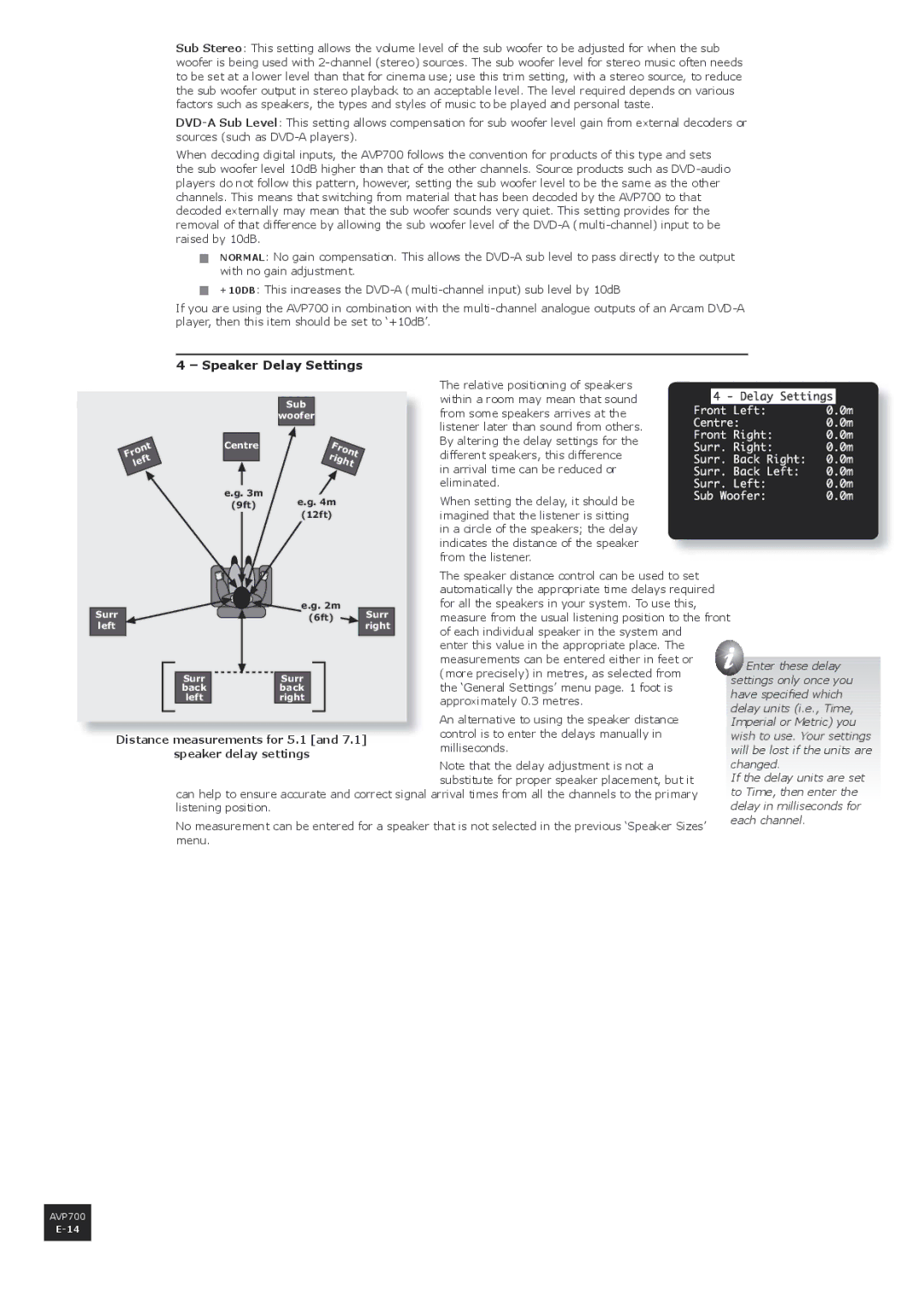
Sub Stereo: This setting allows the volume level of the sub woofer to be adjusted for when the sub woofer is being used with
When decoding digital inputs, the AVP700 follows the convention for products of this type and sets the sub woofer level 10dB higher than that of the other channels. Source products such as
<NORMAL: No gain compensation. This allows the
<+10DB: This increases the
If you are using the AVP700 in combination with the
4 – Speaker Delay Settings
|
|
|
|
|
|
|
| The relative positioning of speakers | |
|
|
|
| ��� |
| within a room may mean that sound | |||
|
|
|
|
| from some speakers arrives at the | ||||
|
|
|
| ������ |
| ||||
|
|
|
|
|
|
|
| listener later than sound from others. | |
|
| ������ |
|
| ����� |
| By altering the delay settings for the | ||
����� |
|
|
|
| different speakers, this difference | ||||
|
|
| ����� |
| |||||
|
|
|
|
|
| ||||
���� |
|
|
|
|
|
| in arrival time can be reduced or | ||
|
|
|
|
|
|
|
| ||
|
| ������� |
|
|
|
| eliminated. | ||
|
| ������� |
| When setting the delay, it should be | |||||
|
| ����� |
| ||||||
|
|
|
| ������ |
| imagined that the listener is sitting | |||
|
|
|
|
|
|
|
| in a circle of the speakers; the delay | |
|
|
|
|
|
|
|
| indicates the distance of the speaker | |
|
|
|
|
|
|
|
| from the listener. | |
|
|
|
|
|
|
|
| The speaker distance control can be used to set | |
|
|
|
|
|
|
|
| automatically the appropriate time delays required | |
���� |
|
|
| ������� | ���� | for all the speakers in your system. To use this, | |||
|
|
| ����� | measure from the usual listening position to the front | |||||
���� |
|
|
|
|
|
| ����� | of each individual speaker in the system and | |
|
|
|
|
|
|
|
| ||
|
|
|
|
|
|
|
| enter this value in the appropriate place. The | |
|
|
|
|
|
|
|
| measurements can be entered either in feet or | |
|
| ���� | ���� |
|
| (more precisely) in metres, as selected from | |||
|
|
|
| the ‘General Settings’ menu page. 1 foot is | |||||
|
| ���� | ���� |
|
| ||||
|
| ���� | ����� |
|
| approximately 0.3 metres. | |||
|
|
|
|
|
|
|
| ||
|
|
|
|
|
|
|
| An alternative to using the speaker distance | |
|
|
|
|
|
|
|
| ||
Distance measurements for 5.1 [and 7.1] | control is to enter the delays manually in | ||||||||
milliseconds. | |||||||||
| speaker delay settings |
| |||||||
|
|
| |||||||
Note that the delay adjustment is not a substitute for proper speaker placement, but it
can help to ensure accurate and correct signal arrival times from all the channels to the primary listening position.
No measurement can be entered for a speaker that is not selected in the previous ‘Speaker Sizes’ menu.
Enter these delay settings only once you have specified which delay units (i.e., Time, Imperial or Metric) you wish to use. Your settings will be lost if the units are changed.
If the delay units are set to Time, then enter the delay in milliseconds for each channel.
AVP700
